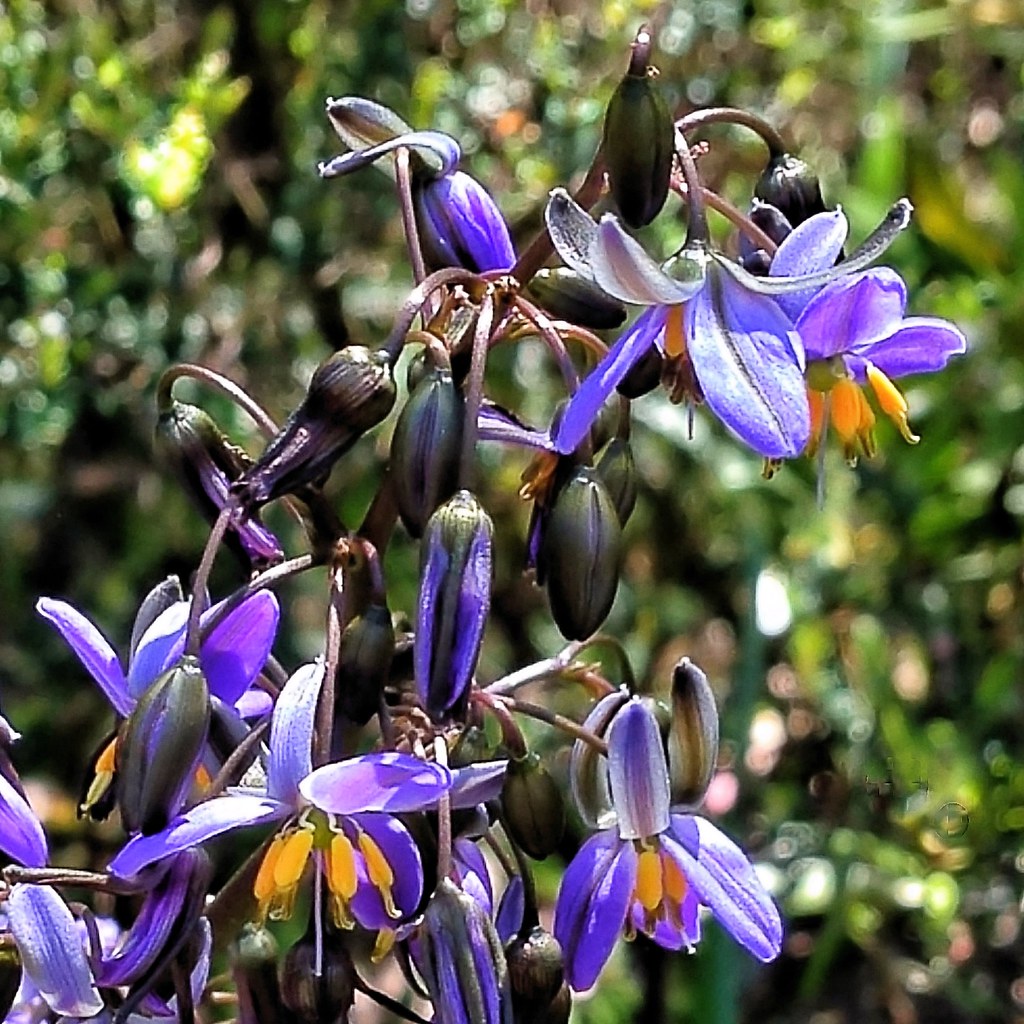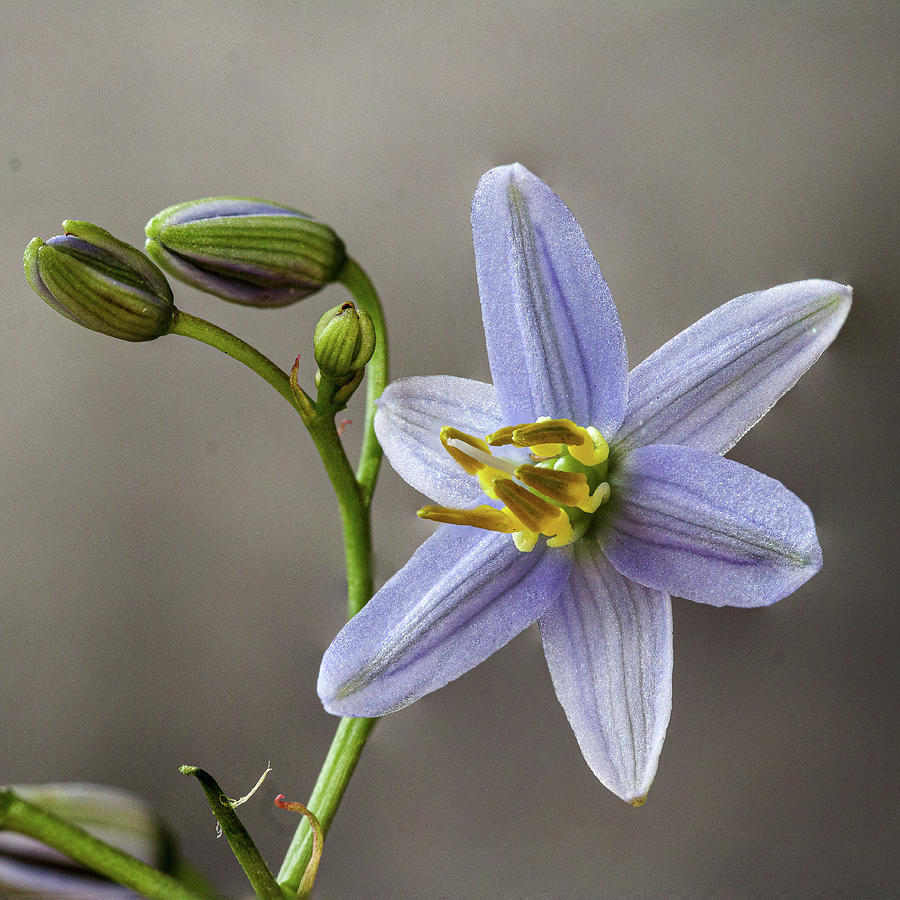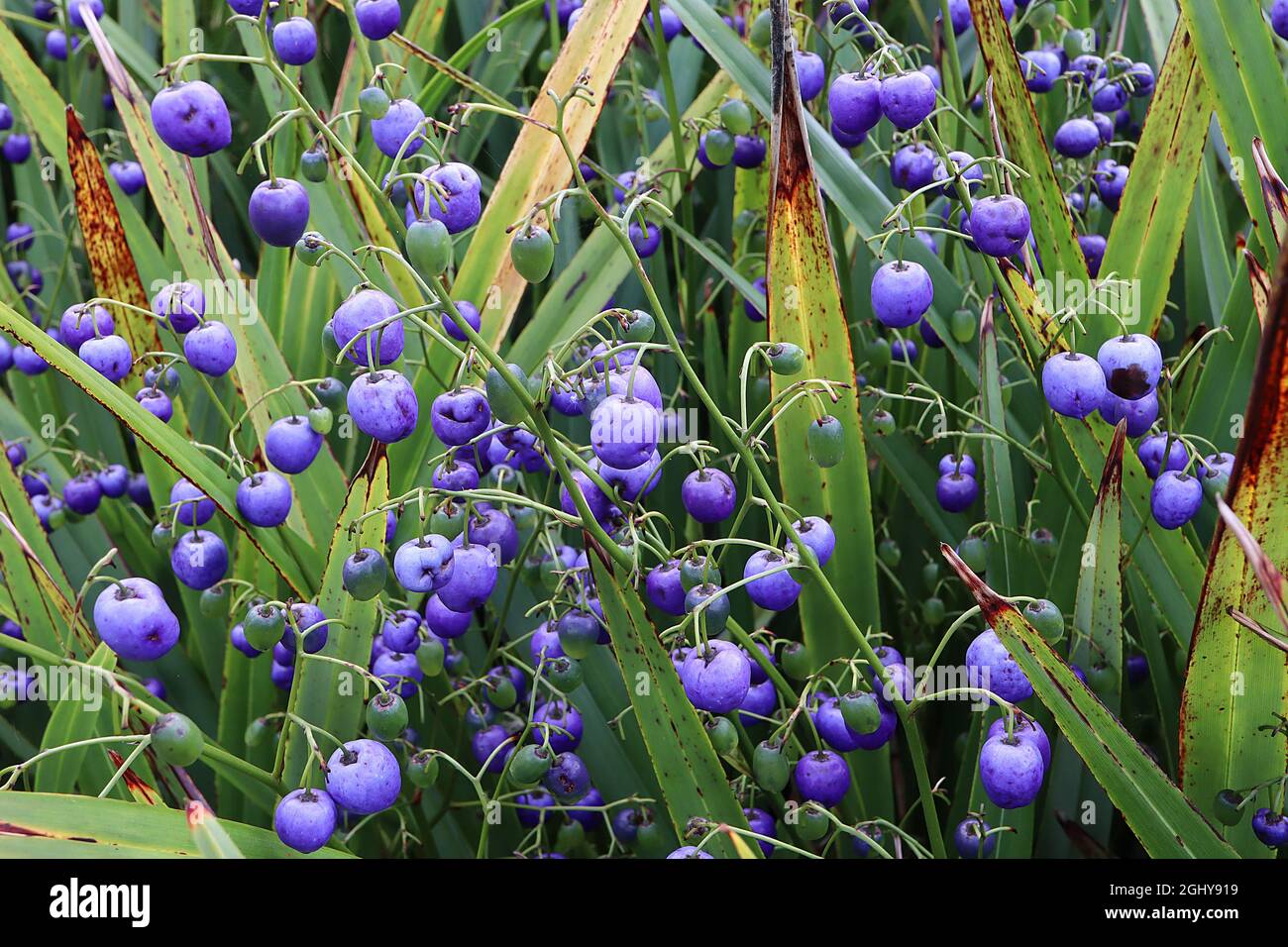
PlantFiles Pictures Dianella, Tasman Flax Lily, Tasmanian Flax Lily 'Variegata' (Dianella
Dianella tasmanica, commonly known as the Tasman flax-lily [2] or Tasmanian flax-lily [3] is a herbaceous strappy perennial herb of the family Asphodelaceae, subfamily Hemerocallidoideae, found in southeastern Australia including Tasmania. It has leaves to 80 cm, and a flower stem to 1.5 m. [4]

Photo of the bloom of Tasman Flax Lily (Dianella tasmanica) posted by HamiltonSquare
Dianella tasmanica, commonly known as the Tasman Flax-lily or Tasmanian Flax-lily is a herbaceous strappy perennial herb of the family Asphodelaceae, subfamily Hemerocallidoideae, found in southeastern Australia including Tasmania. It has leaves to 80 cm, flower stem to 1.5 m, and the berries are not edible.

Photo of the entire plant of Tasman Flax Lily (Dianella tasmanica) posted by HamiltonSquare
Dianella tasmanica, or Tasman Flax Lily, has beautiful variegated foliage that is grass-like in habit. It's striking foliage is a beautiful addition to shady and part sun landscapes. In summer, Tasman flax lily produces stalks of dainty lavender flowers atop the foliage. Following the flowers are metallic blue berries that provide additional.

PlantFiles Pictures Dianella Species, Tasman Flax Lily, Tasmanian Flax Lily (Dianella tasmanica
It is a perennial flower in the Asphodelaceae family, which makes it a relative of the famous asphodel flower of the Mediterranean region. The plant likes shade, is not bothered by deer, and requires little maintenance, making it an ideal perennial for people "on the go" who want to come home to a colorful garden.

PlantFiles Pictures Dianella Species, Tasman Flax Lily, Tasmanian Flax Lily (Dianella tasmanica
Height 0.6-2 m Spread 0.5-2 m Position Full Shade Family Liliaceae Botanical Name Dianella tasmanica Common Name Tasman flax-lily Origin Vic, NSW, Tas Habit Clumping, Spreading, Arching Landscape Plains, Footslopes, Hills Soil Texture Clay, Loam, Sand pH Acidic, Neutral Tolerates Drought, Moderate frost Supplementary Watering Minimal

Tasman Flax Lily Dianella tasmanica 20121229 These pla… Flickr
It is a perennial species found in moist, shaded forests in Tasmania, Victoria and along the east coast of New South Wales. Its common names include Tasman Flax Lily, Flax Lily and Blue Berry Flax Lily.

PlantFiles Pictures Dianella Species, Tasman Flax Lily, Tasmanian Flax Lily (Dianella tasmanica
Flax Lily. Flax lily, Dianella tasmanica, is a spreading perennial with flat, glossy green leaves. This grass-like foliage plant is often used as a groundcover, border plant, or even as an accent plant, to bring color and texture into the landscape. This fast-growing plant also works well in containers. Drought-tolerant flax lily requires.

Dianella tasmanica Yellow StripeTasman Flax Lily pint Plant Vines
Tasman Flax Lily (Dianella tasmanica) General Plant Information ; Plant Habit: Herb/Forb Grass/Grass-like: Life cycle: Perennial: Sun Requirements: Full Sun to Partial Shade: Water Preferences: Mesic Dry Mesic Dry: Soil pH Preferences: Slightly acid (6.1 - 6.5) Neutral (6.6 - 7.3)

PlantFiles Pictures Dianella Species, Tasman Flax Lily, Tasmanian Flax Lily (Dianella tasmanica
In addition to Tasman flax lily, Dianella tasmanica is known by a variety of other common names, including blueberry lily, blue flax lily, and Tasmanian flax lily. Uses. Dianella tasmanica is a popular ornamental plant, prized for its attractive foliage and striking flowers. It can be grown in full sun or partial shade and can tolerate a wide.

Dianella Tasmanica Variegated Flax Lily garden ideas and plants Pinterest Plants, Gardens
Flax lily does best in partial shade to heavy shade. Dianella tasmanica tolerates clay, sand and some water-logging but prefers well-drained soils. Prevent rapidly colonization of Dianella by watering infrequently. Once established, flax lily can be drought tolerant. To keep flax lily looking tidy, remove expired or tattered leaves throughout.

PlantFiles Pictures Dianella Species, Tasman Flax Lily, Tasmanian Flax Lily (Dianella tasmanica
Among our favorites to consider are Dianella tasmanica, a handsome deer-resistant edging plant that is especially attractive when variegated. Plant it in deep shade beneath a tree where its striped bladed foliage will catch stray shafts of sunlight.

Tasman Flaxlily Dianella Tasmanica 140mm
Dianella tasmanica 'Variegata' Description Download Share The Variegated flax lily has a clumping habit in size to 2 ft. tall and stiff pale green sword-like leaves with white striping. Inflorescences of tiny white and yellow flowers occur in spring and are often unnoticed.

Tasman Flax lily Dianella tasmanica Photograph by Deane Palmer Fine Art America
Skip to the beginning of the images gallery Silver Streak Flax Lily Dianella tasmanica 'Silver Streak' Pronunciation: dy-an-NEL-uh tas-MAN-ee-kuh SKU #06606 7-11 Your climate might be too cold for this plant: Change Location Find In Store OVERVIEW DETAILS STYLE CARE HISTORY This Plant's Growing Zones: 7-11 Your USDA Cold Hardiness Zone:

PlantFiles Pictures Dianella, Tasman Flax Lily, Tasmanian Flax Lily 'Variegata' (Dianella
Tasman Flax-Lily is a relatively rare houseplant 🌿 that is easy to grow and needs regular watering to thrive. They do best in abundant sunlight ☀ and should be less than 3 feet from a window. Taxonomy Scientific name Dianella tasmanica Genus Dianella Family Asphodelaceae Order Asparagales Also known as Tasmanian flax-lily and Flax Lily

Dianella tasmanica Tasman flaxlily loose sprays of oval violet blue glossy berries, August
Dianella tasmanica 'Variegata' (White Striped Tasman Flax Lily) - A beautiful strap-leafed perennial with clumps to 18 to 24 inches tall bearing fans of rich green leaves with bold white longitudinal stripes and a finely serrated leaf margin.

PlantFiles Pictures Dianella, Tasman Flax Lily, Tasmanian Flax Lily 'Variegata' (Dianella
Dianella tasmanica is an evergreen Perennial growing to 1 m (3ft 3in) by 0.5 m (1ft 8in) at a medium rate. See above for USDA hardiness. It is hardy to UK zone 9. It is in leaf all year, in flower from May to July. The species is hermaphrodite (has both male and female organs).